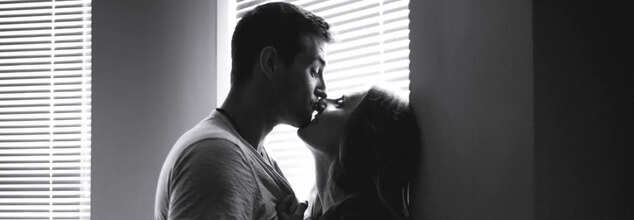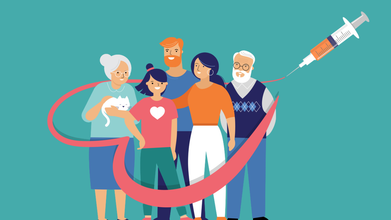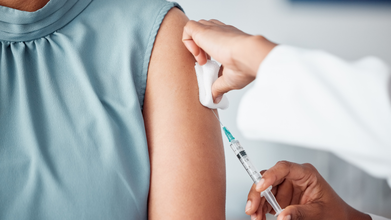- Health Conditions A-Z
- Health & Wellness
- Nutrition
- Fitness
- Health News
- Ayurveda
- Videos
- Medicine A-Z
- Parenting
Kissing Is Dangerous To Your Health-Here's How You Can Ensure Safety

Kissing (Credit: Canva)
The coronavirus pandemic made us realise that kissing could be perilous to health. Now research has found that kissing could also take a toll on your teeth. It is because your mouth is a major entry point for bacteria, yeasts, fungi and all other types of infection. Health experts warn that these microorganisms can get into your body through your mucosal tissue, saliva, swallowing, or even by being breathed into your lungs. In other words, your mouth is a hotspot for spreading all kinds of germs—including the ones that cause cavities and gum disease.
There is empirical evidence that has confirmed that dental cavities and gum disease can be caused by contagious bacteria being spread through activities such as kissing and interestingly, we have found that romantic couples will oftentimes influence each other's microbiome.
Why Oral Hygiene Matters: Risks of Kissing
Brushing your teeth is not just about fresh breath—it could also help you protect your partner's dental health. According to health experts, couples often unknowingly share gum disease. "I've seen many cases where one partner develops gum disease, and a few months later, the other shows similar symptoms," dental health expert Katrina Sander told a leading media outlet. When couples visit the dentist together, they're often surprised by simultaneous diagnoses.
It's not just romantic partners who need to be cautious. Mothers should prioritize oral hygiene to prevent transferring decay-causing bacteria to their babies. "The top risk factor for babies developing cavities is their mother having cavities because kissing often spreads harmful bacteria," Sanders emphasised.
Be mindful of others who kiss your baby as well. A family member with poor oral health or a pet licking a baby’s face may introduce bacteria. While cute moments with pets make great social media content, Sanders reminds parents that animals can influence a baby's oral microbiome in unexpected ways.
How To Ensure Oral Hygiene While Kissing?
So, what can you do to reduce this risk? Sanders recommends seeing a dentist regularly and ensuring you're treated for any active oral disease. Your dental hygienist can suggest ways to keep your mouth's immune system strong while preventing the transmission of bacteria to others. "Things to help strengthen your oral immune system, like a healthy diet, stable pH in the mouth, good rest, appropriate breathing habits, and appropriate routine oral hygiene practices at home, are important," she said.
Even if you're one of those people who love to kiss others to show your affection, you don't have to give that up or start wearing a mask while smooching. Just be sure to take care of your own mouth. Sanders points out that kissing actually has some surprising benefits for your oral health. "Kissing will typically increase saliva flow, and saliva has many antibacterial and healing properties," she said. "Additionally, kissing releases internal chemicals like dopamine, oxytocin, and serotonin which can reduce inflammation and boost immunity."
So, while there are risks involved, a little extra attention to your oral hygiene can go a long way. With a healthy mouth, you can enjoy those affectionate moments — all while helping protect yourself and others.
Fact Check: Top 5 Flu Vaccine Myths In 2025, Busted

Credits: iStock
Is 2025 the year of Flu? This is the right question to ask as we see so many cases of flu from around the world, worst hit countries remain UK, US, and Canada. The hospitalization rates have gone up. In fact Dr Wenqing Zhang, Unit Head for Global Respiratory Threats at the Department of Epidemic and Pandemic Threats Management of the World Health Organization said that this year is marked by "the emergence and rapid expansion of a new AH3N2 virus subclade". This new variant is called J.2.4.1 or subclade K. This was first reported in August in Australia and New Zealand and has since been detected in over 30 countries.
Amid this there are many myths that surrounds the flu vaccine, on whether it should be administered and if one can get a flu despite getting the jab. Health and Me breaks those myths for you.
The biggest misconception that surround the vaccine right now is its effectiveness, since it has been updated before the new strain or the subclade K/ super flu hit the population. However, Professor Antonia Ho, Professor and Honorary Consultant in Infectious Diseases at the University of Glasgow says, "The vaccine remains the most effective means to prevent disease. We still want to encourage people to get the vaccine."
When a new variant emerges, the flu shot can still offer what doctors call cross-protection. In simple terms, the antibodies your body makes after vaccination can recognize similar flu viruses and respond to them.
Also Read: 186 H3N2 Outbreaks As Hospitalization Rates Double On Canada
Here are the top 5 flu vaccine myths in 2025
Myth 1: Influenza is not serious, so I don’t need the vaccine
Fact: Flu is far from harmless. Each year, up to 650,000 people worldwide die from flu-related respiratory complications. Even healthy individuals can fall seriously ill. In some cases, flu can lead to pneumonia, sinus or ear infections, and inflammation of the heart or brain, especially in those with weaker immunity.
Myth 2: The flu vaccine can give me the flu
Fact: The flu shot uses an inactivated virus, which means it cannot cause influenza. Some people may feel mild fever, body aches, or tiredness after vaccination. These symptoms are short-lived and are simply signs that the immune system is responding.
Myth 3: The flu vaccine causes severe side effects
Fact: Flu vaccines have a strong safety record. Serious side effects are extremely rare. Guillain-Barré Syndrome, a condition linked to muscle weakness and paralysis, occurs in about one in a million vaccinated people, making the risk very low.
Myth 4: I took the vaccine and still got the flu, so it doesn’t work
Fact: Many flu viruses circulate each season, and vaccines target the most common ones. While vaccination may not prevent every infection, it greatly reduces the risk of severe illness and complications. It also helps protect people with vulnerable immune systems.
Myth 5: I am pregnant, so I should not get the flu vaccine
Fact: Pregnant women are strongly advised to get vaccinated because pregnancy weakens the immune system. The inactivated flu vaccine is safe at any stage of pregnancy and helps protect both the mother and the baby.
Will The Old Flu Vaccine Protect You Against The New Subclade K?

Credits: iStock
While H3N2 flu cases are surging, one question that is being asked time and again is whether the old vaccines provide protection against this new variant. While the new strain of virus was detected after the vaccine had already undergone its update, the good news is that it still provides the best protection against the illness from H3N2 strains.
The real reason why concerns are prompted about the effectiveness of the seasonal vaccine is because the virus underwent more mutation than scientists expected over summers. This mutant is called the 'subclade K' or 'super flu'. While it is true that most cases this season are of the 'super flu' strain, experts say that the flu jab is still offering a strong protection.
How Effective Is The Flu Jab Against The New Flu Strain?
"The vaccine remains the most effective means to prevent disease. We still want to encourage people to get the vaccine," said Professor Antonia Ho, Professor and Honorary Consultant in Infectious Diseases at the University of Glasgow. Experts have stressed enough on the immunity that one can receive from the vaccine that that these flu jab remain the best defense against the flu, even though the current strain circulated may have drifted away from the strain included in this year's jab.
Data from the UK Health Security Agency (UKHSA) also show that vaccines is performing as expect, despite the emergence of subclade K.
How Is The Flu Jab Developed?
Every year, experts from the World Health Organization, the Centers for Disease Control and Prevention, and other global health agencies closely track flu trends around the world. They study which strains are spreading and use that data to predict which ones are most likely to dominate the upcoming flu season. The annual flu vaccine is then designed to protect against three or four of those strains.
It’s also worth understanding that more than one influenza A strain usually circulates at the same time. So even if the vaccine is not an exact match for a newer H3N2 strain, it still protects against other common flu viruses, which matters, notes Stony Brook Medicine.
When a new variant emerges, the flu shot can still offer what doctors call cross-protection. In simple terms, the antibodies your body makes after vaccination can recognize similar flu viruses and respond to them. You might still get sick, but the vaccine greatly lowers the chances of severe illness, hospitalization, or worse.
The vaccine offers protection against both types of influenza, including A and B.
Also Read: The New Flu Strain Emerged Too Late For Vaccines, And It Is Already Causing Outbreaks
Is There Any Difference Between Influenza A and B?
Influenza A
Influenza A changes quickly. Its genetic makeup shifts often, which is why new strains keep emerging and why it can trigger large outbreaks. It usually shows up early in the flu season and has been responsible for every major flu pandemic recorded so far.
Influenza B
Influenza B is more stable and does not change as rapidly from year to year. It tends to appear later in the season, often peaking in late winter or spring. While it does not cause pandemics, it can still lead to serious illness, particularly in children and young adults.
What Is The Normal Sperm Count To Get Pregnant? Expert Explains

Credits: Canva
When talking about fertility in routine practice, we usually refer to the World Health Organization’s guideline of roughly 15 million sperm per millilitre (and around 39–40 million total per ejaculate) as the lower boundary of “normal.”
But the count alone doesn’t tell the full story. The quality of sperm, their motility, shape, and the couple’s overall reproductive health are equally important. We got in touch with Dr. Meenakshi Priya, Clinical Director & Fertility Specialist, Nova IVF Fertility, Coimbatore, who told us more about the same.
What Is The Normal Sperm Count To Get Pregnant?
Dr Meenakshi said, “Think of sperm count like lottery tickets. More tickets (higher count) give you better odds, fewer tickets lower your chances — but even one well-functioning ticket (a motile, properly shaped sperm) can win.”
That’s why fertility clinics look at several factors: concentration, total number, progressive motility (whether sperm swim forward), and morphology (shape). The WHO manual provides the standard method and cut-offs used worldwide in labs, serving as the referee for semen analysis.
However, numbers matter clinically. Research over decades shows fertility starts to drop gradually below about 40 million/ml (or in older studies, 40 million total per ejaculate was a useful marker). The WHO threshold of 15 million/ml marks the lower edge of normal — values between 15 and 40 are a “grey zone,” where conception is possible but may take longer. So a man with 12 million/ml isn’t infertile, but the couple might need help like IUI or IVF depending on other factors.
But don’t get fixated on one number. A “normal” semen report is a combination of factors:
• Concentration ≥15 million/ml
• Total sperm count ≥39–40 million per ejaculate
• Progressive motility roughly >30%
• Normal morphology about 4% (Kruger criteria)
What Changes A Sperm Count?
Lifestyle and health have a big impact on sperm. Smoking, heavy drinking, extra weight, prolonged heat exposure (saunas, hot tubs, tight underwear), certain medications, recent fevers, and conditions like varicocele or hormonal imbalances can all lower the numbers.
The good news? Most of these are reversible. Dr Meenakshi said, “Quitting smoking, reducing alcohol, losing a bit of weight, avoiding hot tubs for a few months, and treating infections can improve sperm.” Remember, sperm take time to renew but it usually takes 2–3 months of healthier habits for improvements to appear in a report. Be patient; your body is making changes even if you don’t see results immediately.
When To Be Concerned And Consult A Doctor?
If semen analysis repeatedly shows very low sperm (oligozoospermia), no sperm (azoospermia), poor motility, or if a couple has been trying for a year (or six months if the woman is over 35) without success, it’s time to consult a specialist. One abnormal test isn’t the final word — tests are usually repeated, and a more thorough assessment may include hormone checks, ultrasounds, or genetic tests if needed.
Dr Meenakshi said, “Sperm count gives a headline, not the full story. It’s a useful screening tool, but fertility decisions are personal. If you’re concerned, get a proper semen analysis and speak with a fertility specialist — many fertility issues are treatable, and acting early makes a real difference.”
© 2024 Bennett, Coleman & Company Limited

